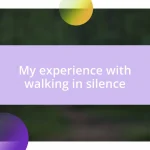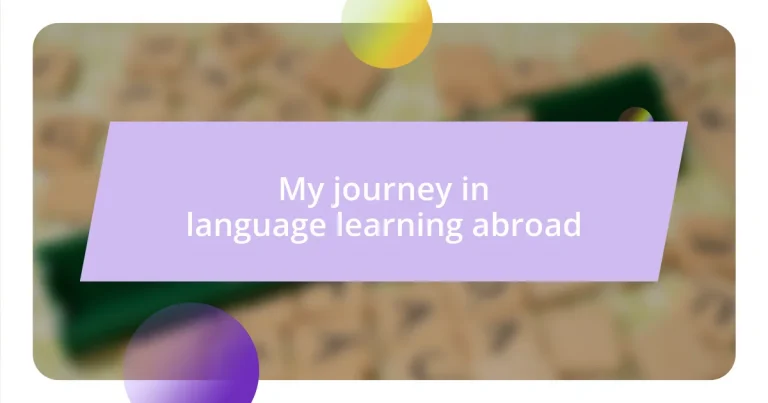Key takeaways:
- Language learning is driven by a desire for cultural connection and personal milestones, enhancing the understanding of others’ identities.
- Choosing the right country and language school is crucial for immersive learning; factors like community support, teaching methods, and cultural immersion significantly affect the experience.
- Building a social network through local interactions, classes, and exchanges enriches language learning and fosters meaningful connections that make the language relevant and enjoyable.
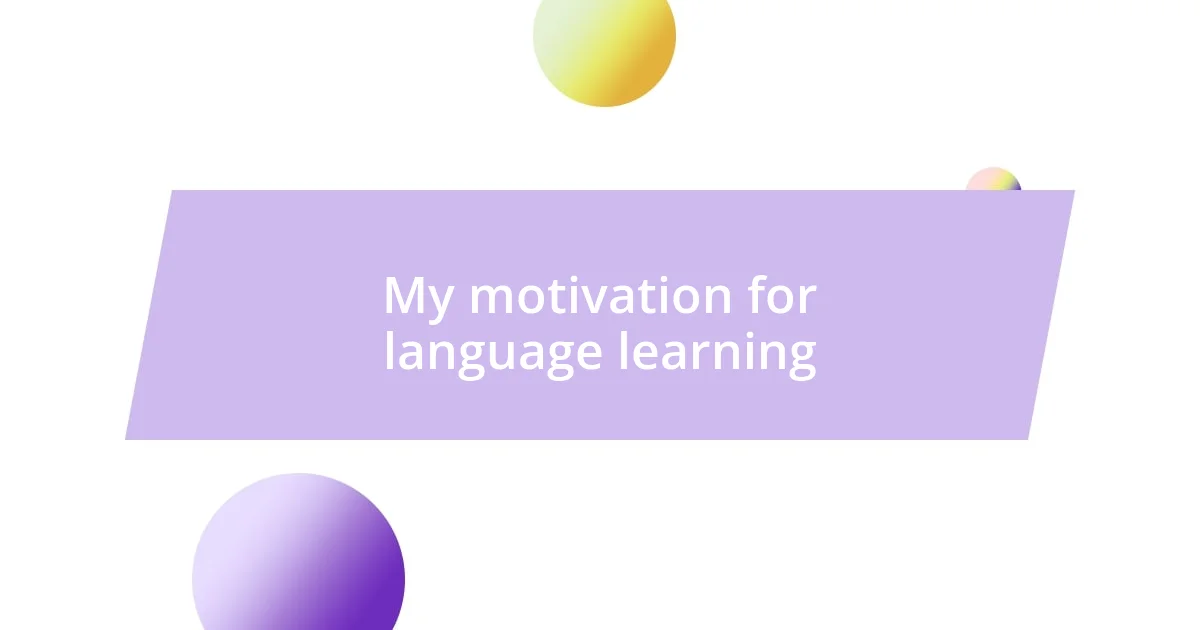
My motivation for language learning
My motivation for language learning has always stemmed from a deep curiosity about different cultures. I remember sitting at a bustling café in Paris, my heart racing as I listened to the melodic flow of French conversations around me. That feeling of longing to connect with people in their own language pushed me to pick up my first language book.
Then there’s the feeling of accomplishment that comes with each milestone. When I first managed to hold a real conversation in Spanish, I felt an exhilarating rush of joy mixed with pride. Have you ever experienced that moment when everything clicks? It’s a unique thrill, one that drives me to keep challenging myself to learn more.
Ultimately, language learning is about connection for me. I recall a late-night talk with a native Italian friend, both of us sharing stories of our homes and dreams in a mix of English and Italian. In that moment, I realized every new word I learned was a bridge to understanding—not just the language, but the very essence of who people are. Isn’t that what makes language so powerful?
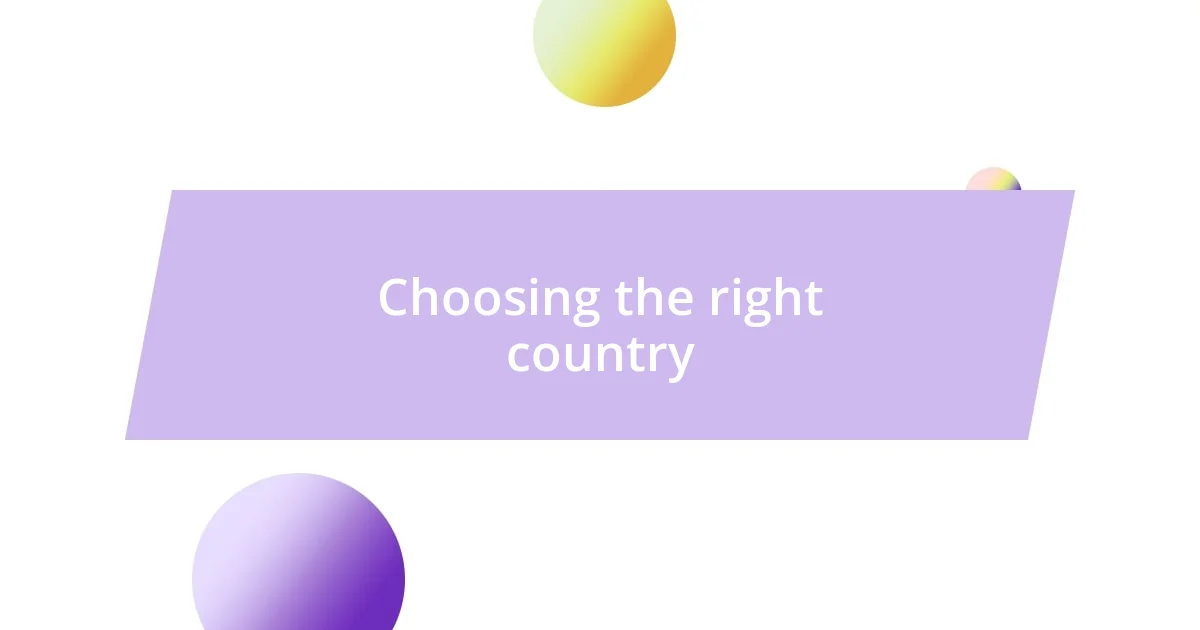
Choosing the right country
Choosing the right country for language learning can profoundly impact your experience. When I pondered my options, I gravitated toward immersive environments where speaking the native language was a daily necessity. I fondly recall my time in Spain, where I’d find myself wandering through vibrant markets, trying to engage with locals about their fresh produce. Each exchange not only tested my Spanish skills but also deepened my appreciation for their culture.
Here are some factors to consider when choosing the right country for your language journey:
- Cultural immersion: How can you dive into the culture while learning the language?
- Language prevalence: Is the language predominantly spoken in daily life, or is it primarily an academic language?
- Community support: Are there groups or classes that can help enhance your learning experience?
- Personal interests: Does the country offer activities or experiences that resonate with your passions, making it easier to engage with the local language?
- Cost of living: How does the expense of living in your chosen country affect your ability to stay and learn effectively?
Reflecting on these aspects can make a significant difference in your language learning adventure. Each choice brings you closer to not just learning words but also fully embodying the spirit of the language.
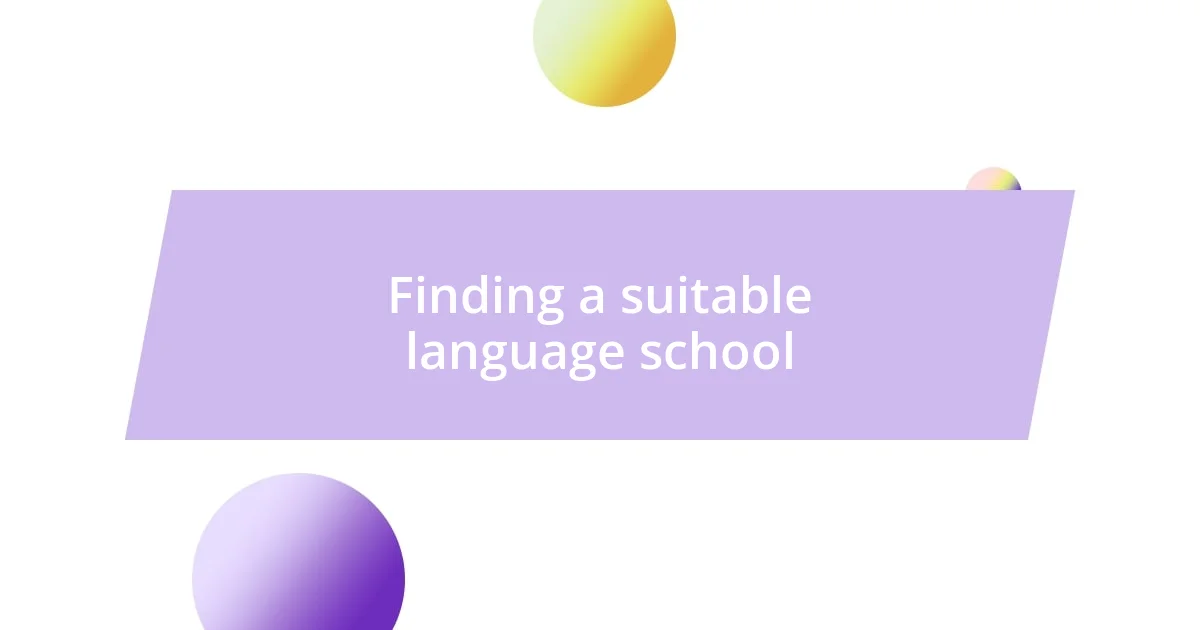
Finding a suitable language school
Finding the right language school is a crucial step in any language learning journey. When I was searching for a school in Buenos Aires, I focused on finding one that matched my learning style and goals. Visiting potential schools allowed me to gauge the atmosphere and get a feel for the community, which I found to be incredibly important. Imagine walking into a bright, welcoming classroom where everyone is eager to engage—it’s a game changer!
I discovered that comparing different schools based on factors like class size, teaching methods, and student reviews could illuminate what might suit me best. For instance, I noticed that some schools emphasized conversational practice, which resonated with my desire to speak confidently. Reflecting on this, I felt that a smaller class size allowed for more personalized attention, enhancing my learning experience. Have you ever felt that connection with a teacher that instantly boosted your motivation? It’s those little details that truly matter.
To further guide your decision-making process, here’s a comparison table showcasing some important factors when selecting a language school:
| Factor | Importance |
|---|---|
| Class Size | Smaller classes offer more individualized attention. |
| Teaching Methodology | Look for schools that focus on immersion and conversation. |
| Location | A central location can facilitate easier interaction with locals. |
| Student Reviews | Reading experiences from past students can provide valuable insights. |
Having these insights and factors in mind helped me feel more confident in my choice. Whether it’s the vibrancy of a school community or the effectiveness of its teaching style, finding a suitable language school can lay a strong foundation for your learning experience.
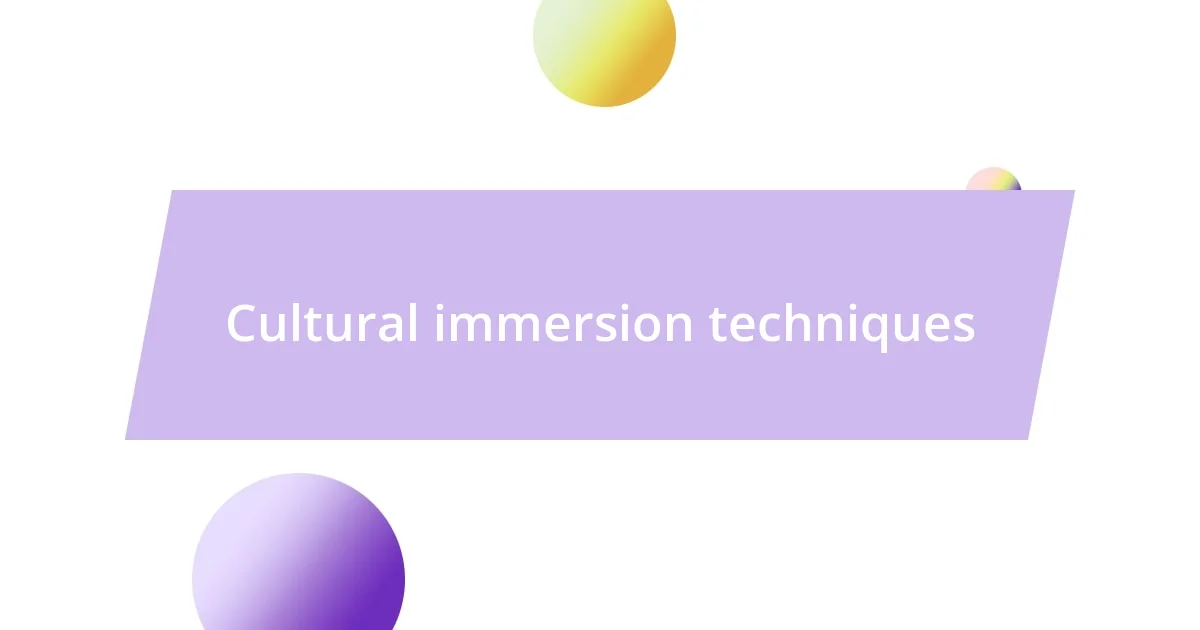
Cultural immersion techniques
Immersing yourself in the culture of your target language can be an enriching experience that goes beyond textbooks and classrooms. I remember the afternoons I spent in local coffee shops in France, striking up conversations with baristas about everything from their favorite pastries to their thoughts on the latest art exhibition. These interactions were a treasure trove of language practice, allowing me to pick up slang and everyday phrases that I never would have learned in a formal setting.
Another technique that greatly enhanced my cultural immersion was participating in community events. When I lived in Mexico City, I eagerly joined local festivals, from Day of the Dead to neighborhood markets. Each event was a dynamic environment filled with laughter, music, and of course, lively discussions in Spanish. Have you ever found yourself lost in the rhythm of a festival, feeling more connected to the language through the emotions it evokes? It’s these moments that transform language learning into a holistic experience.
Volunteering in my community was also a powerful approach. I learned firsthand that helping out at a local charity not only allowed me to practice my language skills but also deepened my understanding of cultural nuances. I vividly recall one volunteer day where I assisted families in need with their grocery shopping. Navigating conversations amidst the hum of activity taught me about the heart of the community and solidified my language abilities in a meaningful context. Isn’t it remarkable how language learning can intertwine with acts of kindness and connection?
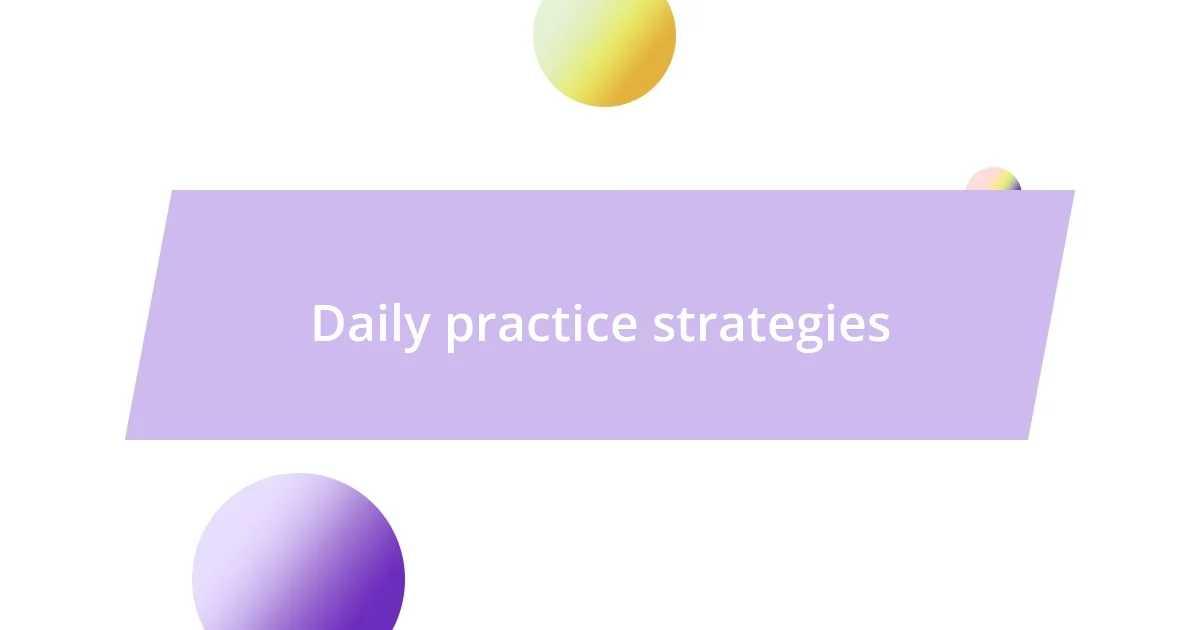
Daily practice strategies
Incorporating daily practice strategies is essential for language retention and growth. Personally, I found that setting aside just 15 minutes each day to practice vocabulary using flashcards made a significant difference. Each time I flipped the card and spoke the word out loud, I felt a spark of achievement, reinforcing my commitment to learning. Have you ever experienced that rush when a word suddenly becomes familiar? It’s like unlocking a little door in your mind.
An engaging approach I adopted was incorporating language into my daily activities. Cooking became a fun language lesson for me; I would read recipes in Spanish, carefully translating each ingredient. This not only built my culinary skills but turned mundane tasks into exciting language practice moments. I remember one evening when I had friends over, and we made paella together while I narrated the recipe in Spanish! Connecting language learning to something I loved transformed it into a joyous experience rather than a chore.
Lastly, keeping a language journal proved invaluable. Each day, I would jot down a few sentences about my experiences, thoughts, or even dreams in the target language. It felt cathartic to express myself and see my progress visually develop over time. Reflecting on my journey this way was like having a conversation with myself—there was vulnerability in mapping out my thoughts, and every word I wrote brought me closer to fluency. Have you considered how writing can unlock your creative expression while honing your language skills?

Building a social network
Building a social network in a new country was a game-changer for my language learning journey. When I landed in Madrid, I instinctively sought out language exchange meetups. I remember the first time I walked into a crowded café, my heart racing with anticipation. It was exhilarating to engage in lively conversations with both locals and fellow learners, forcing myself to step out of my comfort zone. You know that feeling when shared laughter transcends language barriers? It’s pure magic.
Friendships formed through shared interests became a cornerstone of my language practice. I joined a local hiking club, and every hike turned into an opportunity to discuss everything from the best trails to our favorite local cuisines. One unforgettable evening, while camping under the stars with my new friends, we shared stories and jokes in Spanish. I realized that moments like these were not just about building vocabulary; they were about forging connections that made the language feel alive and relevant. Have you ever thought about how friendships can enrich your learning experience?
Another effective way I cultivated my social network was through taking part in local classes, like dance or cooking. Not only did I enjoy the activities themselves, but the chance to interact with others who were equally eager to learn created a supportive environment. I distinctly remember a cooking class where we struggled through a recipe but ended up laughing at our culinary mishaps. Those laughter-filled moments not only built my confidence but also solidified my bond with classmates who became great friends. How often do you find that your social interactions organically boost your language skills?
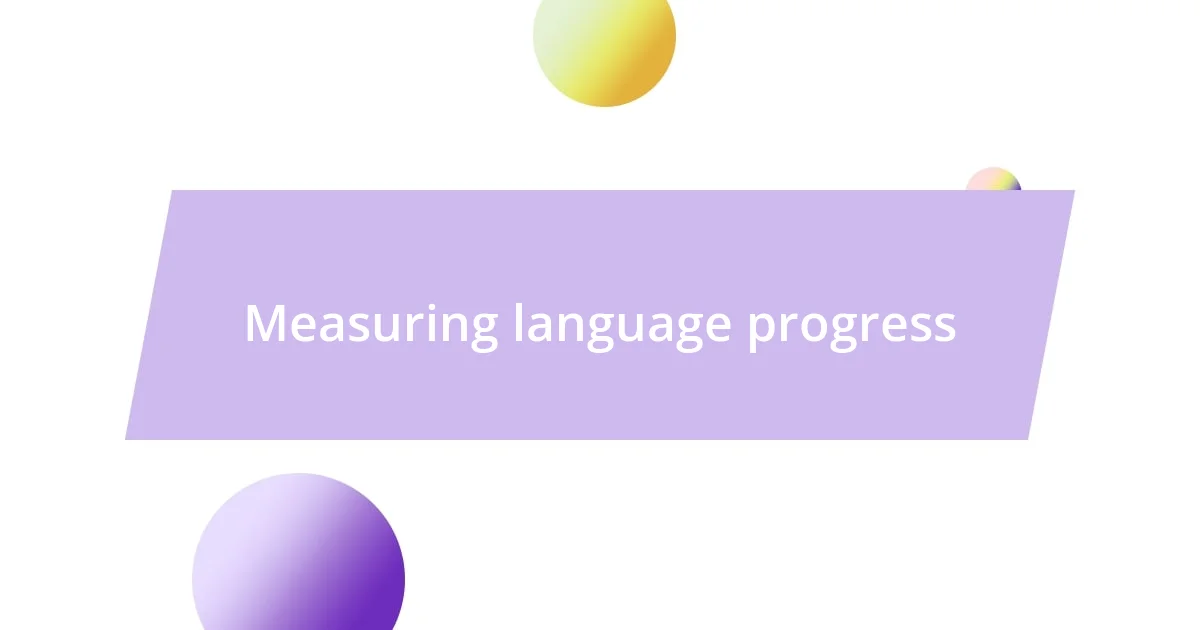
Measuring language progress
Measuring language progress can sometimes feel like a daunting task. I found that a practical approach was to establish specific milestones. For instance, I set a goal to hold a 10-minute conversation entirely in the target language by the end of my third month abroad. When the day arrived, I remember the thrill of successfully chatting with a local, the sense of accomplishment washing over me. Have you ever set a challenge for yourself that pushed you to excel?
Another effective strategy I utilized was tracking my vocabulary growth. I maintained a simple spreadsheet where I would log new words and phrases, categorizing them by context—like food, travel, or social situations. Recently, when I reviewed my entries, I was pleasantly surprised by how many terms I had amassed. That moment of recognition not only validated my efforts but also highlighted areas where I still needed improvement. Don’t you think seeing tangible evidence of progress can be incredibly motivating?
Lastly, I made it a habit to periodically assess my comprehension through various mediums—like music, podcasts, and movies. I vividly recall the first time I understood a full song in Spanish without looking up the lyrics. That euphoric moment was a true testament to my progress; it felt like discovering a secret door leading deeper into the language. Have you experienced that wonderful realization when everything suddenly clicks into place? Reflecting on these tangible experiences provided me not only with a sense of achievement but also with a clearer roadmap for where to focus my future efforts.







